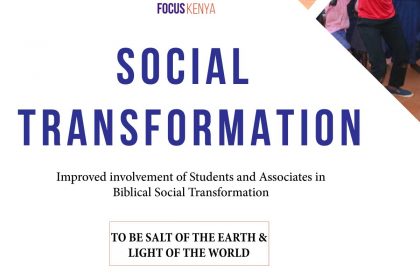
In the new FOCUS Kenya Strategic Plan for 2021-2025, Social Transformation is one of the Strategic Priority Area (SPA 4). Some would wonder what exactly is Social Transformation, what the expected results are, and what it has to do with Christians. Others would be wondering why it is significant for a Christian movement/organization like FOCUS Kenya to spend resources, time, and efforts on such issues. Shouldn’t we be just depopulating hell through passionate evangelism? This article attempts to answer these questions and possibly inspire you to join in the journey for the next five years of Improved involvement of Students and Associates in Biblical Social Transformation.
The deficit in the practice of the Christian faith
According to the 2019 Kenya Population and Housing Census Report, 85.5 percent of the population are Christians; Protestants, Catholics, and Evangelical churches accounting for 33.4, 20.6, and 20.4 percent, respectively (Kenya F. , 2020). One would consider this a critical mass for Social Transformation, yet there are many social, economic, and political challenges in our country. For example, in the universities and colleges, there is massive exam cheating, gambling, deliberately missing classes, drug and substance abuse, negative ethnicity, homicides among others. Insecurity, mental health challenges, poor sanitation, and water scarcity are also evident in our institutions. In our country poverty, diseases such as cholera, high infant mortality rate, injustices, massive unemployment, bad governance, and corruption are issues we face every day. One does not need a close look to notice issues of gender-based violence, early marriages, exploitation of the poor, among others In our communities.
These challenges point to the possible deficit in the practice of the Christian faith. They are rooted in the sinfulness of human beings, and they demand God’s people to respond through evangelism and radical compassion through Social Action (Fellowship, 1982); offering immediate relief but working to change the unjust systems causing the oppression and social evils both in institutions of higher learning and in our nation.
Kenyans agree that something is not right and there is a need for change, especially in the value system, nurturing common good and integrity at all levels, and building patriotism. Christian students in the institutions of higher learning and graduates need to answer to questions such as; what role can they play in bringing the needed transformation? How should their faith in Jesus Christ respond and inform social transformation? How do they contribute to building a country we are all proud of? These are questions SPA 4 seeks to answer by creating awareness, building capacity for engagement, and providing opportunities for transformation both at an individual level and as a community. We believe students and graduates provide a critical mass in the application of the Christian faith at an individual and societal level. Ideally, a transformation from a Christian community is expected due to a considerable influence of Christianity leading to fewer social vices. Biblical doctrines and teachings should transform individual lives, trickling down to the society to ensure economic prosperity, political stability, moral and social sanity, low rates of corruption, and love for their “neighbors”.
In a society with 85.5% Christians, the value system should be that of integrity, people living with positivity and are actively engaging in social transformation through faithfully adopting biblical principles and teachings in their lives and systems (Beyers, 2017).
Is it a question of how or whether?
Transformation in a biblical view is the change from a way of life that is contrary to God’s purpose to one in which people can enjoy the fullness of life in harmony with God (John10:10, Eph 4:13 & Col 3:8-15). This transformation is possible when individuals and communities are obedient to the Gospel of Jesus Christ.
Social Transformation is a fundamental change in society brought about by gradual and incremental changes in different aspects of society. It involves changes in different areas or aspects of society that are interdependent, where a change in one sub-system influences changes in another, and when the changes reinforce each other, they give overall sustainable development (Kenya F., 2019).
Another common phrase is Social Change, which is a way human interactions and relationships transform social and cultural institutions over time, having a profound impact on society especially through social movements such as the fight for a multi-party system in Kenya, civil rights movement in the USA, legalization of abortion in different societies in the world that previously were against it. These movements have changed relationships, institutions, and cultural norms over time (Dunfey, 2019).
The question is not whether Christianity promotes social change but in what ways and conditions it promotes or inhibits change. Transformation is possible when godly principles directly influence people’s perceptions and actions. And when there is a leadership that can express desired change, motivate action, and provide direction for a critical mass of people. Historically, Christianity has caused societal transformation through normal believers ingraining biblical principles in the society and transformational leaders. Martin Luther King Junior led the civil rights movement in the USA. David Gitari used his platform as a Bishop to speak truth to the political leadership and actively engaged in the democratization of Kenya. Timothy Njoya advocated for political and social justice reforms in Kenya. And Abraham Lincoln led the emancipation of slaves in America. These men inspired and led social transformation because their Christian faith formed a potent basis of authority in their pursuit for change (Erasmus, 2004).
God is both the creator and the judge of all men. Christians should therefore share His concern for justice and reconciliation in every aspect of human society and liberation of every man from every kind of oppression. One of the most fundamental truths that should inspire Christians involvements in social transformation is that man is made in the image of God, regardless of color, race, religion, class, sex, or age, and has an intrinsic dignity that should be respected, served, and not exploited (Congress, 1974). Social transformation is about expressing the teachings of God, our love for our neighbors, and our obedience to Jesus Christ. Christian faith inspires a love for people but also a judgment on every form of oppression, discrimination, alienation and should therefore denounce injustice and evil wherever it exists (Congress, 1974). The bible says believers were “created in Christ Jesus for good works which God prepared beforehand, that we should walk in them” (Eph. 2: 10). Good works cannot save, but they are indispensable evidence of salvation (James 2:14-26). What are your good works? How evident are they?
Can we count on you now and here?
As we implement the Strategic Priority Area 4; Social Transformation, we hope to inspire students and Christian professionals to become conscientious students and citizens who take personal initiative to bring transformation.
For students in institutions of higher learning, we hope they will become Christians who take initiatives, create and lead social programs, be informed and participate in political issues in their institutions and nationally, advocate and dissent according to biblical principles. We hope and pray they will build movements, join groups and associations that champion specific issues in their institutions and communities. We also hope they will research socio-economic issues, and organize appropriate action. Finally, we hope they will use their training for the good of their communities as they solve socio-economic problems.
For Associates, we look forward to seeing business leaders championing reforms in our labor rights, improved working conditions, and fair treatment of workers. We hope to see you on the front line, advocating and lobbying for better social services from the government. We hope that you will be encouraged to take up challenging positions for the greater good, join a political party, run for a political seat, and be part of the change we want to see in this country.
Managing the challenges ahead
As we seek positive transformation through the establishment of God’s kingdom, not only in people’s lives but also in our unjust systems and processes, we appreciate the challenges that await. Individual Christians must be willing to submit and engage in the process of change, as God is shaping and molding into His image and likeness. Change is however a complex process that Charles Kraft, in his book Anthropology of Christian Witness, suggests has to start in the minds of individuals (Cannon, 2017). Through the renewal of their minds, believers, have the opportunity to see the world from God’s eyes and bring the needed transformation. Far too often the church focuses on the individual transformation (which is the start of change and is very critical) but neglects to address God’s call upon them to transform the society around them by being agents of change.
According to John Kotter in his book Leading Change, which he wrote for Harvard Business School, he argues that many change agents act out of a feeling of need after experiencing dissatisfaction, deprivation, or dehumanization. Sometimes they don’t experience this at a personal level, but they have some proximity to people or communities who experience some kind of oppression. They exhibit an openness to change through a clear expression of curiosity, interest, and inclination to experiment. John Kotter also highlights some inhibitors to change which are very critical to understand (Cannon, 2017). They include:
- Too much complacency makes people not motivated to do the necessary work for transformation to happen. He says that the quest for change must be inspired by a great deal of passion, urgency, and commitment to overcome complacency. As Kenyan Christians, how tired are we of the situation in our country? Do we have what it takes to overcome complacency?
- Lack of a clear leadership team of committed individuals willing to continually lead the process of change. Who is leading the process of change and transformation and how committed are they?
- Poor understanding of the problem and the root causes of the problem. Most of the time people are focusing on the indicators as opposed to the root causes. It is difficult to pursue intentional change if people do not have a clear idea of the problem they need to address. Most people have an idea that something “just isn’t right” without a clear sense of what the problem might be. The problem is the “software” and it needs to be reset.
- Lack of a clear vision of how different things could be and how to achieve the vision. The Bible says “without vision, the people perish” Proverbs 29:18.
Our hope and work will be focused on overcoming these inhibitors to ensure Christian students and professionals overcome complacency, understand the root causes of the problems, join us in the vision for transformation, and the leadership teams are well equipped for the task ahead.
Conclusion
As highlighted earlier many issues need to change. Social transformation is possible. The question is, how can you and I, inspired by our Christian faith, engage in one or two of those problems so that collectively we can achieve social transformation in Kenya?





Wow, what an eye opening, comprehensive and detailed write up on social transformation!
May God help the students, associates and each Christian to act in love but judging the evils!
Am challenged and motivated at the same time.
Thank you Diana and God bless you.